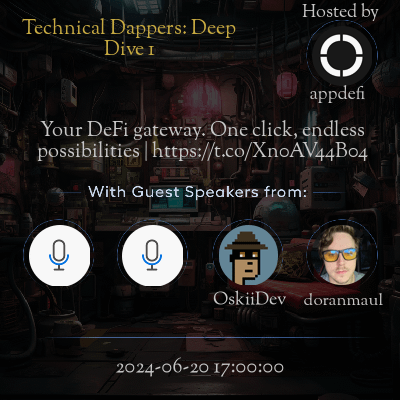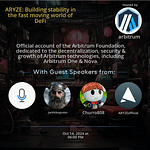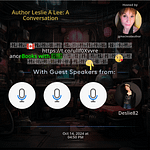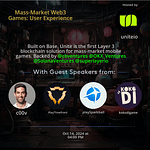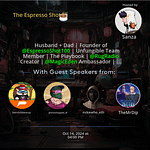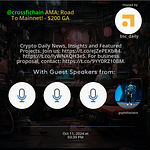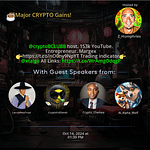This space is hosted by appdefi
Space Summary
The Twitter space featured an engaging discussion encompassing a wide array of topics, from the principles of free speech to personal legal battles and global conflicts. Participants shared compelling personal stories that highlighted resilience amidst challenges and questioned the current frameworks governing free speech on social platforms. The dialogue touched upon the influence of technology, particularly algorithmic content moderation, and debated whether context could be preserved in digital communication. Influential figures like Elon Musk were critiqued for their role in advocating for free speech, while real-world implications were examined. By comparing modern-day conflicts to historical wars, the discussion provided a deep dive into the criteria defining global conflicts. At its core, the space underscored how past experiences shape present-day perspectives, leaving listeners with rich insights into moral, ethical, and social issues impacting today's society.
Questions
Q: How reliable is social media for free speech?
A: While it provides a platform, there are significant limitations and moderation.
Q: What personal challenges have impacted you significantly?
A: Individual experiences reflecting struggles with law and social systems.
Q: How should we interpret current global conflicts?
A: Comparing modern conflicts with historical wars based on impact and global involvement.
Q: Is technology a boon or bane for free speech?
A: Technology helps communication but also imposes restrictions through AI and algorithms.
Q: Should context play a critical role in content moderation?
A: Absolutely, context significantly changes the impact and understanding of content.
Q: What personal anecdotes resonate with social issues?
A: Stories reflecting resilience, legal battles, and social perceptions.
Q: Can influential figures truly change social platforms?
A: Figures like Elon Musk claim to support free speech, but real-world practices vary.
Q: What defines a global conflict?
A: Historically, widespread impact and significant casualties have defined wars.
Q: Are algorithms effective in moderating content accurately?
A: Algorithms often fail to capture context, leading to misinterpretation.
Q: How do past experiences shape current perspectives?
A: Personal history and events significantly influence current opinions and theories.
Highlights
Time: 00:00:40
Start of Discussion: Establishing sound clarity.
Time: 00:00:43
Personal Anecdotes: Reflecting on past experiences.
Time: 00:46:37
Legal Struggles: Challenges with law and personal rights.
Time: 00:46:47
Global Conflict Definition: Debating what constitutes a world war.
Time: 00:54:47
Free Speech on Platform: Assessing if true free speech exists.
Time: 00:55:01
Content Moderation: Impact of strict moderation policies.
Time: 00:55:36
Importance of Context: How context changes content interpretation.
Time: 00:55:43
Algorithmic Challenges: Discussing the role of AI in moderation.
Time: 00:56:00
Influential Figures: Influence of leaders like Elon Musk on platforms.
Time: 00:56:20
Ethical Debates: Delving into morality and ethical decisions.
Time: 00:57:00
Optimism for the Future: Ending on a positive note about future changes.
Key Takeaways
- Importance of free speech with platform limitations.
- Personal anecdotes showcasing resilience and struggles.
- Analysis of current events and historical parallels.
- Debates on moral and ethical questions in society.
- Technology's role in communication and content moderation.
- Past experiences shaping present perspectives.
- Influence of figures like Elon Musk on social platforms.
- Defining criteria for global conflicts.
- Impact of algorithms and AI on free speech.
- Context's significance in communication interpretation.
- Emphasis on human factors in decision-making.
Behind the Mic
Well, I'm waiting on the uploaded file to be opened. Here is the conversation itself: Yeah, so I think it's March. We've got an ongoing bug bounty on the lead there. We still have a long way to go in terms of building out, but we've had some really good developments in terms of our engineering team, product team expanding the base platform, and then of course, the first app is Dafi, and that's super exciting. So who wants to go first? Just tell me a little bit about what you're working on, both in building out Dafi or your vision for the overall app space that we're building at the moment? Who would like to go first? All Yours Truly. Chris, why don't you go? Okay. Do you just want to ping us one at a time, or should we just jump in? Oh, yeah, I'll ping you one at a time. Chris, I know, for example, you're working on track, and that's gonna be Realtalk super critical for telling the story of how the ecosystem is coming together. You know, Dafi's app and everything that everybody's working on. So what's new on track? What are you excited about? And what can people expect if they haven't already dabbled? Yeah, sure. Yeah, absolutely. Track is one of our marquis products. I mean, it's a along with vault and some of the other infrastructure goodies. Track is the primary way that people can use and own no-code automation in the Defi space, so to speak. And yeah, we're continuing to build it out. We think that it's a really important product category. The reception that we've had from the community has been absolutely incredible up until now. But some of the build out that we're doing at the moment is, we're actually, CTO is leading this effort, and JL, product lead for Dafi on the same side. We're working on making track extensible. So we've rewritten large parts of it into onboard new builders. And what this means is that if you've got an idea for an app or product or smart contract that you need to build out an absolute variable for to open-source automate and share that with community, you can do so as an extension on track. So we've got some cool things in mind. The other thing is improving the user experience with a new track that just got released on our website two weeks ago now, I think. And yeah, it's just going to continually get better and better. Not only for the apps that we're building out, that Dafi to be automated, but also for the external community who are bringing on and really innovating in this space. I mean, innovation is key to manage their products in the Defi space. So that's primarily what I'm working on the moment and loving it. Yeah, super excited about that. Amazing stuff. And George, I know you're working on building a more general smart contract platform to sort of seamlessly tie together all of the disparate chains that were sort of living across any given point in time. How's that been going? And what are the next steps? What roadblocks are you running into? What are the next milestones? And how can people actually help in building the project? Yeah, absolutely. So one of the core features of our system is this idea of a smart account. And so, okay, so let me start from the kind of the problem definition. If you want to use all the different EVM chains, all the different layer twos, and even things like Solana, you need to have a wallet that has gas native token of that chain. And as soon as you start expanding out to more than one or two chains, it all becomes very unwieldy. You have all this different dust across different wallets and it becomes very difficult to manage. And so from the perspective of gas, you can solve the problem of gas if you enable someone else to sponsor that transaction for you. And so we're using something called ERC 4337 account abstraction, which, long story short, enables you to hold an asset, let's say USDC, on a particular chain. And you don't actually need that gas token to exchange that token anymore because Defi app is sponsoring that transaction. That just means that our users are not going to need to worry about having all of these different gas tokens on, let's say five different EVM chains that they're using, which is not only complicated and difficult, but it's also not very cost efficient because you end up, maybe you'll want to use base chain while base is popular, but then once base is not popular, you might have like $12 of the gas token on base, and then you can't quite be bothered to move it or you forget you have it or whatever. It's just not capitally efficient. So it solves two problems there. It's easier to use an account abstracted wallet because you don't have to worry about gas tokens. We're sponsoring those tokens and it's also extremely capitally efficient. So that's like a reasonably new ethereum standard that's being adopted across EVM chains, and it enables us to onboard our users onto any EVM chain without having to worry about those complexities of gas tokens. Amazing, amazing stuff. So, and just sort of like bird's eye view I know we've sort of addressed this and even in broader terms during the presentation today, but we sort of exercise those AI and orchestration tools that are built into the Defi app and those those partnerships directly into the ecosystem that the team is building up as a broader vision. So how are you seeing that kind of unfold? And I know things that happen very quickly, but where some areas were flaring, tailoring, and I'm curious how you're seeing this kind of fold as a product lead. Yeah, I mean you're absolutely right, right? It just kind of moves very quickly, but we need to have a very cohesive strategy around how these fit together. And one of the things I'm working closely with our friends and more closely with real life partners in the defi space is integrating into Defi app is like smart contract aggregates. So that goes along very well with the very well with our orchestration tools. And we recently just have I think it's super resource management, which we have some in today. But basically smart contracts running on the BNB chain, because BNB chain recently recently rolled out variable gas fees in the bloc. So the problem here is even our partners on board have their gas tokens offsite no matter what, some of them are paying micro fees and others are status so low, that we become like, this isn't fair to our customers, this isn't fair to our partners. So we have this, this onfleet and that we I'm very, very close they plugged into the app at the moment. I'm very carefully to network carefully into that. So sid advanced routing and tooling frameworks alongside our BNB chains and on our asset fees like reserve management all that to basically standardize this stuff for partners, get everyone on the same playing field. And actually integrate that orchestration tool for an asset in an app in a very rapid, easy efficient way. That interface in the defi app does that for them in an absolute quick manner. Awesome, awesome stuff. I mean it just makes things so much easier for the end users. And I know we're working with the team on a lot of other really cool products you know sort of looking towards the future. So dude, thanks for sharing that. And Marcus, I know you're also working on some absolutely crazy sort of community initiatives and you've got you've made some amazing headway. Especially, I think with which chains the communities are focusing on the initiatives there. And sure, you're working hard months and months and it's really starting to show dividends now. So please, please tell me this is a bit of a secret but like tell us what's going on and share it with it, you know. Oh my God, yes. So it's really funny because the ethos behind it is so exciting. It kind of reminds me a lot of what we're doing over here. They're just like seven guys in a room throwing stuff against the wall and hoping it sticks. And you know, lucky for them they had some good investors on board to let them do that. And now they're they're waking up and they're like, Oh my God, it sticks. And so, you know, they're quietly putting together something incredible like incremental releases over time. Kind of like what we're doing. That's what makes me so bullish about where we are right now because it definitely echoes a lot of what they were doing in the early days. And so not only Mir but a couple of other projects we've got in the pipeline. But I do think it's important to continue to iterate on that to kind of as we talk about building a sandwich that some of the pieces of bread we put in, they're a little stale. But eventually once the sandwich comes together it's gonna taste great. So, yeah, we're really excited to see and really exciting this like super slow. There's no rush in plugging all these pieces together. Super slow build. Even though there's a lot of intensity around our sprints, especially from some of our standout developers, it's still in a way there's no rush. And so that's some of the coolest stuff about it. Appreciate the question. Definitely Marcus. Appreciate you sharing that with us. And then I think last but certainly certainly not least, Chris, I know you're working on some really cool things with on the general product side of things, right? And so they're kind of cross teams within within the Defi app. Where are things at? What are you sort of focused on right now and any teasers you want to share with the community? Sure. So I, I'm leaning completely on my product manager. I'm in the weeds 30 plus hours a week just on our day to day build. And so I lean on her a lot because she's awesome and she has really great ideas. You guys all know her and love her. But I was thinking about this idea of introducing multiple economies in the discord. And the way that you earn in those different economies is different for each one. So with the current economy, you earn dappies by chatting via yap to earn and also contributing, be it a tweet on the timeline, or an engagement with the tweet, or some artwork or some content. And that's manual attribution. But automatic attribution of the dappies comes from the yap to earn, chatting in the discord. So what if we have another economy where you have to mine for this particular thing and you can only mine so often? And all this happens in the discord. It's got sort of an rpg feel. Some people don't like it, like doing it. Some people would rather yap, other people would rather mine. So then all of a sudden, in grand exchange, we've got this trading economy that sprouts up. Hey, I'll give you six of my moon rocks for six of your dappies. And then this cool thing emerges. And like I say, it all just it has to do with collaboration. That makes it broken. And if there's a common goal, some type of empire of everything that we can look toward building together, getting the collaborative deliberately to collaborate to build that thing together. I think that's what's gonna be key. And so the second economy I won't, I won't say what actually it is yet, but we'll get it to get, we'll get some more information out soon about that. And I'm just I'm really, really stoked to see that happen. Yeah, I think what we and everyone here on these calls are just amazing. And like, they are just all of us. But I think having always community chiming in and sharing their ideas on these is just it's just an absolute dream to kind of put this out. And now that you mentioned the engagement on these things, we have. Should we? It might be worth having these q&a calls like as often as we can just because I think everyone's interested in being here and just being able to share all this all these cool updates with them. So appreciate you hopping on sharing that week pummels and thanks for jumping in. And in the same way, I feel it's really in here as well with a small team. It's clear to also I think that's what's really making it impactful. Thank you all. Yeah, I know there's no pressure. That's incredible. Thank you. I know we've got others who can't jump in today just because of some constraints. But we're going to be doing a lot more of these. It's not just going to be like, like I say, so the actual product team that I'm working with half of the time, it's a really small team and they're they're really making it. So can we with the community to build this, it's just about launching these things and launching them right and kind of catering the experience. So we've got a lot more coming miss. Alright, well, I think we're running out of time here. So we should probably wrap this up. I know I got a hard stop at the top of the hour. But just wanted to say a huge thank you to everybody for joining today. I think we had an amazing, amazing chat today. I've got some really exciting stuff in the pipeline. I can't wait to share more as we continue to build. And so I think we're going to make it these regular things do a little pep talks and share updates with the community. Thanks everybody for jumping in and everybody listening in. Really appreciate your time. Really appreciate your questions. And we'll see you on the next one. All right. Take care guys. Have a good weekend. Bye. Thank you very much. Thank you guys. Have a great weekend. Bye.
